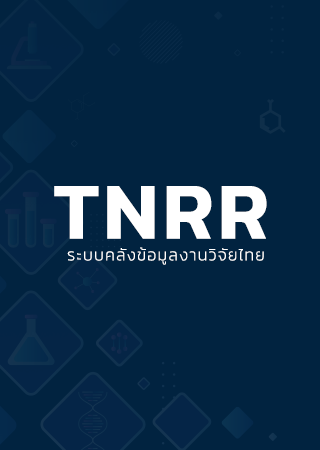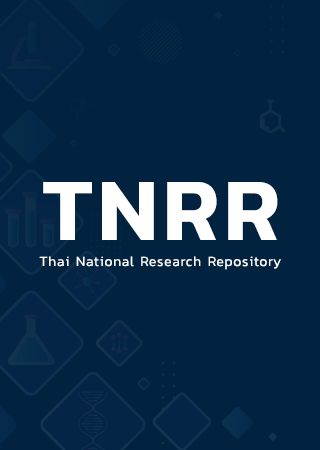Description
การศึกษานี้มีวัตถุประสงค์เพื่อประเมินอิทธิพลของความเข้มข้นของสารสกัดจากใบสะเดาที่แตกต่างกันต่อการยับยั้งกระบวนการไนตริฟิเคชั่น ประสิทธิภาพการใช้ไนโตรเจน การเจริญเติบโตและผลผลิตของข้าวที่ปลูกในดินที่มีระดับความชื้นแตกต่างกัน โดยมีปัจจัยการศึกษา 2 ปัจจัย คือ ปัจจัยที่ 1 ความชื้นดิน ได้แก่ ดินที่มีความชื้นความจุสนาม ดินที่อิ่มตัวด้วยน้ำ และดินน้ำขัง และปัจจัยที่ 2 คือ ความเข้มข้นของสารสกัดจากใบสะเดา ได้แก่ ไม่ใช้สารยับยั้งไนตริฟิเคชั่น สารไนตราไพริน และสารสกัดจากใบสะเดาที่ความเข้มข้น 0.2, 0.4 และ 0.8 กรัม/มิลลิลิตร ดำเนินการทดลองภายใต้โรงเรือนทดลอง โดยใช้ข้าวพันธุ์ กข.22 ซึ่งเป็นข้าวพันธุ์ไม่ไวแสงเป็นพืชทดสอบ ผลการทดลองแสดงให้เห็นว่า การลดความชื้นดินจากดินน้ำขังเป็นดินที่อิ่มตัวด้วยน้ำและดินที่ความจุสนามทำให้อัตราไนตริฟิเคชั่นเพิ่มขึ้น ตามลำดับ การใช้สารสกัดจากใบสะเดาที่มีความเข้มข้น 0.4 กรัม/มิลลิกรัม ในดินที่ระดับความชื้นความจุสนามทำให้จำนวนแบคทีเรียแกรมลบและอัตราไนตริฟิเคชั่นลดลง ในขณะที่การใช้ 0.2 กรัม/มิลลิกรัม ในดินน้ำขังทำให้มีการยับยั้งไนตริฟิเคชั่นมากที่สุด การลดความชื้นดินจากดินน้ำขังเป็นดินที่อิ่มตัวด้วยน้ำไม่ได้ทำให้ผลผลิตข้าวลดลง แต่เมื่อลดความชื้นดินเป็นความชื้นที่ระดับความจุสนามทำให้ผลผลิตลดลง 44.5 เปอร์เซ็นต์ การใช้สารสกัดสะเดาความเข้มข้น 0.4 กรัม/มิลลิลิตร ในดินน้ำขังทำให้ผลผลิตข้าวเพิ่มขึ้นเมื่อเปรียบเทียบกับดินความชื้นเดียวกันแต่ไม่มีการใช้สารยับยั้งไนตริฟิเคชั่น ในทางตรงกันข้าม การใช้สารสกัดสะเดาทุกความเข้มข้นในดินที่อิ่มตัวด้วยน้ำและดินที่ความจุสนามทำให้ผลผลิตข้าวลดลง เมื่อเปรียบเทียบกับดินที่ไม่ได้ใช้สารยับยั้งไนตริฟิเคชั่นที่ระดับความชื้นของดินเท่ากัน การลดความชื้นดินทำให้พัฒนาการและวันเก็บเกี่ยวของข้าวช้าลง โดยการลดความชื้นเป็นดินที่อิ่มตัวด้วยน้ำทำให้วันเก็บเกี่ยวข้าวช้าออกไปอีก 8 วัน และเมื่อลดความชื้นดินเป็นดินที่ความจุสนามทำให้วันเก็บเกี่ยวข้าวช้าลง 21 วัน นอกจากนี้ยังพบว่า การลดความชื้นดินจากดินน้ำขังเป็นดินที่อิ่มตัวด้วยน้ำและดินที่ความจุสนามทำให้ปริมาณการใช้น้ำเพิ่มขึ้น 63 และ 44.1 เปอร์เซ็นต์ ตามลำดับ<br><br>This study aimed to evaluate the effects of different concentrations of neem leaf extract on nitrification inhibition, nitrogen use efficiency, growth, and rice yield in soil with varying moisture contents. Under greenhouse conditions, the trial was performed on two factors: (i) soil moisture levels (field capacity, saturated, and flooded); and (ii) neem leaf extract concentrations (no nitrification inhibitor, nitrapyrin, and neem leaf extract concentrations of 0.2, 0.4, and 0.8 g/ml). The rice variety RD22, which is not photosensitive, was used as a test plant. Nitrification rates increased as soil moisture content decreased from flooded to saturated and field capacity soils. Nitrification rates increased gradually as soil moisture contents decreased from flooded to saturated and field capacity soils consecutively. Neem leaf extract at 0.4 g/ml in the field capacity soil decreased the number of Gram-negative bacteria and the nitrification rate. Meanwhile, 0.2 g/ml of the extract brought about the highest nitrification inhibition in flooded soil. Adjusting from flooded to saturated soil did not result in different rice yields. Nevertheless, decreasing flooded to the field capacity soil decreased grain yield by 44.5%. The extract at 0.4 g/ml in the flooded soil significantly increased rice yield compared to that soil without the inhibitor. On the contrary, all neem extract treatments in saturated and field capacity soils decreased rice yield compared to the no inhibitor treatment at the same soil moisture levels. Decreasing soil moisture contents led to delays in the development of the rice plant and grain harvest by 8 days for saturated soil and 21 days for field capacity soils compared to the flooded soil. In addition, soil moisture levels decreased from flooded to saturated and field capacity soils, increasing by 63 and 44.1%, respectively.
Date of Publication :
02/2023
Publisher :
สำนักงานการวิจัยแห่งชาติ (วช.)
Category :
รายงานการวิจัย
Total page :
77012 pages
People Who Read This Also Read


